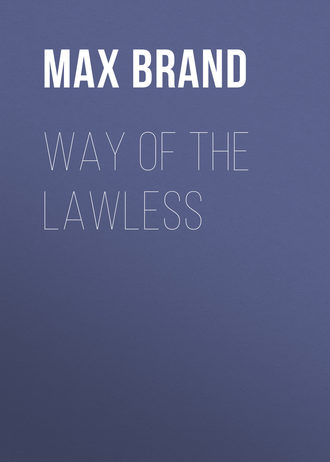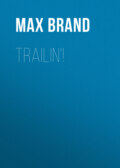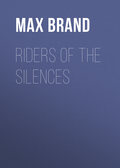
Макс Брэнд
Way of the Lawless
CHAPTER 19
He had to be guided by what Uncle Jasper had often described—a mountain whose crest was split like the crown of a hat divided sharply by a knife, and the twin peaks were like the ears of a mule, except that they came together at the base. By the position of those distant summits he knew that he was in the ravine leading to the cabin of Hank Rainer, the trapper.
Presently the sun flashed on a white cliff, a definite landmark by which Uncle Jasper had directed him, so Andrew turned out of his path on the eastern side of the gully and rode across the ravine. The slope was steep on either side, covered with rocks, thick with slides of loose pebbles and sand. His horse, accustomed to a more open country, was continually at fault. He did not like his work, and kept tossing his ugly head and champing the bit as they went down to the river bottom.
It was not a real river, but only an angry creek that went fuming and crashing through the cañon with a voice as loud as some great stream. Andrew had to watch with care for a ford, for though the bed was not deep the water ran like a rifle bullet over smooth places and was torn to a white froth when it struck projecting rocks. He found, at length, a place where it was backed up into a shallow pool, and here he rode across, hardly wetting the belly of the gelding. Then up the far slope he was lost at once in a host of trees. They cut him off from his landmark, the white cliff, but he kept on with a feel for the right direction, until he came to a sudden clearing, and in the clearing was a cabin. It was apparently just a one-room shanty with a shed leaning against it from the rear. No doubt the shed was for the trapper's horse.
He had no time for further thought. In the open door of the cabin appeared a man so huge that he had to bend his head to look out, and Andrew's heart fell. It was not the slender, rawboned youth of whom Uncle Jasper had told him, but a hulking giant. And then he remembered that twenty years had passed since Uncle Jasper rode that way, and in twenty years the gaunt body might have filled out, the shock of bright-red hair of which Jasper spoke might well have been the original of the red flood which now covered the face and throat of the big man.
"Hello!" called the trapper. "Are you one of the boys on the trail? Well, I ain't seen anything. Been about six others here already."
The blood leaped in Andrew, and then ran coldly back to his heart. Could they have outridden the gelding to such an extent as that?
"From Tomo?" he asked.
"Tomo? No. They come down from Gunter City, up yonder, and Twin Falls."
And Andrew understood. Well indeed had Hal Dozier fulfilled his threat of rousing the mountains against this quarry. He glanced westward. It was yet an hour lacking of sundown, but since mid-morning Dozier had been able to send his messages so far and so wide. Andrew set his teeth. What did cunning of head and speed of horse count against the law when the law had electricity for its agent?
"Well," said Andrew, slipping from his saddle, "if he hasn't been by this way I may as well stay over for the night. If they've hunted the woods around here all day, no use in me doing it by night. Can you put me up?"
"Can I put you up? I'll tell a man. Glad to have you, stranger. Gimme your hoss. I'll take care of him. Looks like he was kind of ganted up, don't it? Well, I'll give him a feed of oats that'll thicken his ribs."
Still talking, he led the gelding into his shed. Andrew followed, took off the saddle, and, having led the chestnut out and down to the creek for a drink, he returned and tied him to a manger which the trapper had filled with a liberal supply of hay, to say nothing of a feed box stuffed with oats.
A man who was kind to a horse could not be treacherous to a man, Andrew decided.
"You're Hank Rainer, aren't you?" he asked.
"That's me. And you?"
"I'm the unwelcome guest, I'm afraid," said Andrew. "I'm the nephew of Jasper Lanning. I guess you'll be remembering him?"
"I'll forget my right hand sooner," said the big, red man calmly. But he kept on looking steadily at Andrew.
"Well," said Andrew, encouraged and at the same time repulsed by this calm silence, "my name is one you've heard. I am—"
The other broke in hastily. "You are Jasper Lanning's nephew. That's all I know. What's a name to me? I don't want to know names!"
It puzzled Andrew, but the big man ran on smoothly enough: "Lanning ain't a popular name around here, you see? Suppose somebody was to come around and say, 'Seen Lanning?' What could I say, if you was here? 'I've got a Lanning here. I dunno but he's the one you want.' But suppose I don't know anything except you're Jasper's nephew? Maybe you're related on the mother's side. Eh?" He winked at Andrew. "You come along and don't talk too much about names."
He led the way into the house and picked up one of the posters, which lay on the floor.
"They've sent those through the mountains already?" asked Andrew gloomily.
"Sure! These come down from Twin Falls. Now, a gent with special fine eyes might find that you looked like the gent on this poster. But my eyes are terrible bad mostly. Besides, I need to quicken up that fire."
He crumpled the poster and inserted it beneath the lid of his iron stove. There was a rush and faint roar of the flame up the chimney as the cardboard burned. "And now," said Hank Rainer, turning with a broad smile, "I guess they ain't any reason why I should recognize you. You're just a plain stranger comin' along and you stop over here for the night. That all?"
Andrew had followed this involved reasoning with a rather bewildered mind, but he smiled faintly in return. He was bothered, in a way, by the extreme mental caution of this fellow. It was as if the keen-eyed trapper were more interested in his own foolish little subterfuge than in preserving Andrew. "Now, tell me, how is Jasper?"
"I've got to tell you one thing first. Dozier has raised the mountains, and I could never cross 'em now."
"Going to turn back into the plains?"
"No. The ranges are wide enough, but they're a prison just the same. I've got to get out of 'em now or stay a prisoner the rest of my life, only to be trailed down in the end. No, I want to stay right here in your cabin until the men are quieted down again and think I've slipped away from 'em. Then I'll sneak over the summit and get away unnoticed."
"Man, man! Stay here? Why, they'll find you right off. I wonder you got the nerve to sit there now with maybe ten men trailin' you to this cabin. But that's up to you."
There was a certain careless calm about this that shook Andrew to his center again. But he countered: "No, they won't look specially in houses. Because they won't figure that any man would toss up that reward. Five thousand is a pile of money."
"It sure is," agreed the other. He parted his red beard and looked up to the ceiling. "Five thousand is a considerable pile, all in hard cash. But mostly they hunt for this Andrew Lanning a dozen at a time. Well, you divide five thousand by ten, and you've got only five hundred left. That ain't enough to tempt a man to give up Lanning—so bad as all that."
"Ah," smiled Andrew, "but you don't understand what a stake you could make out of me. If you were to give information about me being here, and you brought a posse to get me, you'd come in for at least half of the reward. Besides, the five thousand isn't all. There's at least one rich gent that'll contribute maybe that much more. And you'd get a good half of that. You see, Hal Dozier knows all that, and he knows there's hardly a man in the mountains who would be able to keep away from selling me. So that's why he won't search the houses."
"Not you," corrected the trapper sharply. "Andy Lanning is the man Dozier wants."
"Well, Andrew Lanning, then," smiled the guest. "It was just a slip of the tongue."
"Sometimes slips like that break a man's neck," observed the trapper, and he fell into a gloomy meditation.
And after that they talked of other things, until supper was cooked and eaten and the tin dishes washed and put away. Then they lay in their bunks and watched the last color in the west through the open door.
If a member of a posse had come to the door, the first thing his eyes fell upon would have been Andrew Lanning lying on the floor on one side of the room and the red-bearded man on the other. But, though his host suggested this, Andrew refused to move his blankets. And he was right. The hunters were roving the open, and even Hal Dozier was at fault.
"Because," said Andrew, "he doesn't dream that I could have a friend so far from home. Not five thousand dollars' worth of friend, anyway."
And the trapper grunted heavily.
CHAPTER 20
It was a truth long after wondered at, when the story of Andrew Lanning was told and retold, that he had lain in perfect security within a six-hour ride from Tomo, while Hal Dozier himself combed the mountains and hundreds more were out hunting fame and fortune. To be sure, when a stranger approached, Andrew always withdrew into the horse shed; but, beyond keeping up a steady watch during the day, he had little to do and little to fear.
Indeed, at night he made no pretense toward concealment, but slept quite openly on the floor on the bed of hay and blankets, just as Hank Rainer slept on the farther side of the room. And the great size of the reward was the very thing that kept him safe. For when men passed the cabin, as they often did, they were riding hard to get away from Tomo and into the higher mountains, where the outlaw might be, or else they were coming back to rest up, and their destination in such a case was always Tomo. The cabin of the trapper was just near enough to the town to escape being used as a shelter for the night by stray travelers. If they got that close, they went on to the hotel.
But often they paused long enough to pass a word with Hank, and Andrew, from his place behind the door of the horse shed, could hear it all. He could even look through a crack and see the faces of the strangers. They told how Tomo was wrought to a pitch of frenzied interest by this manhunt. Well-to-do citizens, feeling that the outlaw had insulted the town by so boldly venturing into it, had raised a considerable contribution toward the reward. Other prominent miners and cattlemen of the district had come forward with similar offers, and every day the price on the head of Andrew mounted to a more tempting figure.
It was a careless time for Andrew. After that escape from Tomo he was not apt to be perturbed by his present situation, but the suspense seemed to weigh more and more heavily upon the trapper. Hank Rainer was so troubled, indeed, that Andrew sometimes surprised a half-guilty, half-sly expression in the eyes of his host. He decided that Hank was anxious for the day to come when Andrew would ride off and take his perilous company elsewhere. He even broached the subject to Hank, but the mountaineer flushed and discarded the suggestion with a wave of his hand. "But if a gang of 'em should ever hunt me down, even in your cabin, Hank," said Andrew one day—it was the third day of his stay—"I'll never forget what you've done for me, and one of these days I'll see that Uncle Jasper finds out about it."
The little, pale-blue eyes of the trapper went swiftly to and fro, as if he sought escape from this embarrassing gratitude.
"Well," said he, "I've been thinkin' that the man that gets you, Andy, won't be so sure with his money, after all. He'll have your Uncle Jasper on his trail pronto, and Jasper used to be a killer with a gun in the old days."
"No more," smiled Andrew. "He's still steady as a rock, but he hasn't the speed any more. He's over seventy, you see. His joints sort of creak when he tries to move with a snap."
"Ah," muttered the trapper, and again, as he started through the open door, "Ah!"
Then he added: "Well, son, you don't need Jasper. If half what they say is true, you're a handy lad with the guns. I suppose Jasper showed you his tricks?"
"Yes, and we worked out some new ones together. Uncle Jasper raised me with a gun in my hand, you might say."
"H'm!" said Hank Rainer.
When they were sitting at the door in the semidusk, he reverted to the idea. "You been seein' that squirrel that's been runnin' across the clearin'?"
"Yes."
"I'd like to see you work your gun, Andy. It was a sight to talk about to watch Jasper, and I'm thinkin' you could go him one better. S'pose you stand up there in the door with your back to the clearin'. The next time that squirrel comes scootin' across I'll say, 'Now!' and you try to turn and get your gun on him before he's out of sight. Will you try that?"
"Suppose some one hears it?" "Oh, they're used to me pluggin' away for fun over here. Besides, they ain't anybody lives in hearin'."
And Andrew, falling into the spirit of the contest, stood up in the door, and the old tingle of nerves, which never failed to come over him in the crisis, was thrilling through his body again. Then Hank barked the word, "Now!" and Andrew whirled on his heel. The word had served to alarm the squirrel as well. As he heard it, he twisted about like the snapping lash of a whip and darted back for cover, three yards away. He covered that distance like a little gray streak in the shadow, but before he reached it the gun spoke, and the forty-five-caliber slug struck him in the middle and tore him in two. Andrew, hearing a sharp crackling, looked down at his host and observed that the trapper had bitten clean through the stem of his corncob.
"That," said the red man huskily, "is some shootin'."
But he did not look up, and he did not smile. And it troubled Andrew to hear this rather grudging praise.
In the meantime, three days had put the gelding in very fair condition. He was enough mustang to recuperate swiftly, and that morning he had tried with hungry eagerness to kick the head from Andrew's shoulders. This had decided the outlaw. Besides, in the last day there had been fewer and fewer riders up and down the ravine, and apparently the hunt for Andrew Lanning had journeyed to another part of the mountains. It seemed an excellent time to begin his journey again, and he told the trapper his decision to start on at dusk the next day.
The announcement brought with it a long and thoughtful pause.
"I wisht I could send you on your way with somethin' worthwhile," said Hank Rainer at length. "But I ain't rich. I've lived plain and worked hard, but I ain't rich. So what I can give you, Andy, won't be much."
Andrew protested that the hospitality had been more than a generous gift, but Hank Rainer, looking straight out the door, continued: "Well, I'm goin' down the road to get you my little gift, Andy. Be back in an hour maybe."
"I'd rather have you here to keep me from being lonely," said Andrew. "I've money enough to buy what I want, but money will never buy me the talk of an honest man, Hank."
The other started. "Honest enough, maybe," he said bitterly. "But honesty don't get you bread or bacon, not in this world!"
And presently he stamped into the shed, saddled his pony, and after a moment was scattering the pebbles on the way down the ravine. The dark and silence gathered over Andrew Lanning. He had little warmth of feeling for Hank Rainer, to be sure, but the hush of the cabin he looked forward to many a long evening and many a long day in a silence like this, with no man near him. For the man who rides outside the law rides alone.
He could have embraced the big man, therefore, when Hank finally came back, and Andrew could hear the pony panting in the shed, a sure sign that it had been ridden hard.
"It ain't much," said Hank, "but it's yours, and I hope you get a chance to use it in a pinch." And he dumped down a case of.45 cartridges.
After all, there could have been no gift more to the point, but it gave Andrew a little chill of distaste, this reminder of the life that lay ahead of him. And in spite of himself he could not break the silence that began to settle over the cabin again. Finally Hank announced that it was bedtime for him, and, preparing himself by the simple expedient of kicking off his boots and then drawing off his trousers, he slipped into his blankets, twisted them tightly around his broad shoulders with a single turn of his body, and was instantly snoring. Andrew followed that example more slowly. Not since he left Martindale, however, had he slept soundly. Take a tame dog into the wilderness and he learns to sleep like a wolf quickly enough; and Andrew, with mind and nerve constantly set for action like a cocked revolver, had learned to sleep like a wild thing in turn. And accordingly, when he wakened in the middle of the night, he was alert on the instant. He had a singular feeling that someone had been looking at him while he slept.
CHAPTER 21
First of all, naturally, he looked at the door. It was now a bright rectangle filled with moonlight and quite empty. There must have been a sound, and he glanced over to the trapper for an explanation. But Hank Rainer lay twisted closely in his blankets.
Andrew raised upon one elbow and thought. It troubled him—the insistent feeling of the eyes which had been upon him. They had burned their way into his dreams with a bright insistence.
He looked again, and, having formed the habit of photographing things with one glance, he compared what he saw now with what he had last seen when he fell asleep. It tallied in every detail except one. The trousers which had lain on the floor beside Hank's bed were no longer there.
It was a little thing, of course, but Andrew closed his eyes to make sure. Yes, he could even remember the gesture with which the trapper had tossed down the trousers to the floor. Andrew sat up in bed noiselessly. He slipped to the door and flashed one glance up and down. Below him the hillside was bright beneath the moon. The far side of the ravine was doubly black in shadow. But nothing lived, nothing moved. And then again he felt the eye upon him. He whirled. "Hank!" he called softly. And he saw the slightest start as he spoke. "Hank!" he repeated in the same tone, and the trapper stretched his arms, yawned heavily, and turned. "Well, lad?" he inquired.
But Andrew knew that he had been heard the first time, and he felt that this pretended slow awakening was too elaborate to be true. He went back to his own bed and began to dress rapidly. In the meantime the trapper was staring stupidly at him and asking what was wrong.
"Something mighty queer," said Andrew. "Must have been a coyote in here that sneaked off with your trousers, unless you have 'em on."
Just a touch of pause, then the other replied through a yawn: "Sure, I got 'em on. Had to get up in the night, and I was too plumb sleepy to take 'em off again when I come back."
"Ah," said Andrew, "I see."
He stepped to the door into the horse shed and paused; there was no sound. He opened the door and stepped in quickly. Both horses were on the ground, asleep, but he took the gelding by the nose, to muffle a grunt as he rose, and brought him to his feet. Then, still softly and swiftly, he lifted the saddle from its peg and put it on its back. One long draw made the cinches taut. He fastened the straps, and then went to the little window behind the horse, through which had come the vague and glimmering light by which he did the saddling. Now he scanned the trees on the edge of the clearing with painful anxiety. Once he thought that he heard a voice, but it was only the moan of one branch against another as the wind bent some tree. He stepped back from the window and rubbed his knuckles across his forehead, obviously puzzled. It might be that, after all, he was wrong. So he turned back once more toward the main room of the cabin to make sure. Instead of opening the door softly, as a suspicious man will, he cast it open with a sudden push of his foot; the hulk of Hank Rainer turned at the opposite door, and the big man staggered as though he had been struck.
It might have been caused by his swift right-about face, throwing him off his balance, but it was more probably the shock that came from facing a revolver in the hand of Andrew. The gun was at his hip. It had come into his hand with a nervous flip of the fingers as rapid as the gesture of the card expert.
"Come back," said Andrew. "Talk soft, step soft. Now, Hank, what made you do it?"
The red hair of the other was burning faintly in the moonlight, and it went out as he stepped from the door into the middle of the room, his finger tips brushing the ceiling above him. And Andrew, peering through that shadow, saw two little, bright eyes, like the eyes of a beast, twinkling out at him from the mass of hair.
"When you went after the shells for me, Hank," he stated, "you gave the word that I was here. Then you told the gent that took the message to spread it around—to get it to Hal Dozier, if possible—to have the men come back here. You'd go out, when I was sound asleep, and tell them when they could rush me. Is that straight?"
There was no answer.
"Speak out! I feel like shovin' this gun down your throat, Hank, but I won't if you speak out and tell me the truth."
Whatever other failings might be his, there was no great cowardice in Hank Rainer. His arms remained above his head and his little eyes burned. That was all.
"Well," said Andrew, "I think you've got me, Hank. I suppose I ought to send you to death before me, but, to tell you the straight of it, I'm not going to, because I'm sort of sick. Sick, you understand? Tell me one thing—are the boys here yet? Are they scattered around the edge of the clearing, or are they on the way? Hank, was it worth five thousand to double-cross a gent that's your guest—a fellow that's busted bread with you, bunked in the same room with you? And even when they've drilled me clean, and you've got the reward, don't you know that you'll be a skunk among real men from this time on? Did you figure on that when you sold me?"
The hands of Hank Rainer fell suddenly, but now lower than his beard. The fingers thrust at his throat—he seemed to be tearing his own flesh.
"Pull the trigger, Andy," he said. "Go on. I ain't fit to live."
"Why did you do it, Hank?"
"I wanted a new set of traps, Andy; that was what I wanted. I'd been figurin' and schemin' all autumn how to get my traps before the winter comes on. My own wasn't any good. Then I seen that fur coat of yours. It set me thinking about what I could do if I had some honest-to-goodness traps with springs in 'em that would hold—and—I stood it as long as I could."
While he spoke, Andrew looked past him, through the door. All the world was silver beyond. The snow had been falling, and on the first great peak there was a glint of the white, very pure and chill against the sky. The very air was keen and sweet. Ah, it was a world to live in, and he was not ready to die!
He looked back to Hank Rainer. "Hank, my time was sure to come sooner or later, but I'm not ready to die. I'm—I'm too young, Hank. Well, good-by!"
He found gigantic arms spreading before him.
"Andy," insisted the big man, "it ain't too late for me to double-cross 'em. Let me go out first and you come straight behind me. They won't fire; they'll think I've got a new plan for givin' you up. When we get to the circle of 'em, because they're all round the cabin, we'll drive at 'em together. Come on!"
"Wait a minute. Is Hal Dozier out there?"
"Yes. Oh, go on and curse me, Andy. I'm cursin' myself!"
"If he's there, it's no use. But there's no use two dyin' when I try to get through. Only one thing, Hank; if you want to keep your self-respect don't take the reward money."
"I'll see it burn first, and I'm goin' with you, Andy!"
"You stay where you are; this is my party. Before the finish of the dance I'm going to see if some of those sneaks out yonder, lyin' so snug, won't like to step right out and do a caper with me!"
And before the trapper could make a protest he had drawn back into the horse shed.
There he led the chestnut to the door, and, looking through the crack, he scanned the surface of the ground. It was sadly broken and chopped with rocks, but the gelding might make headway fast enough. It was a short distance to the trees—twenty-five to forty yards, perhaps. And if he burst out of that shed on the back of the horse, spurred to full speed, he might take the watchers, who perhaps expected a signal from the trapper before they acted, quite unawares, and he would be among the sheltering shadows of the forest while the posse was getting up its guns.
There was an equally good chance that he would ride straight into a nest of the waiting men, and, even if he reached the forest, he would be riddled with bullets.
Now, all these thoughts and all this weighing of the chances occupied perhaps half a second, while Andrew stood looking through the crack. Then he swung into the saddle, leaning far over to the side so that he would have clearance under the doorway, kicked open the swinging door, and sent the chestnut leaping into the night.






